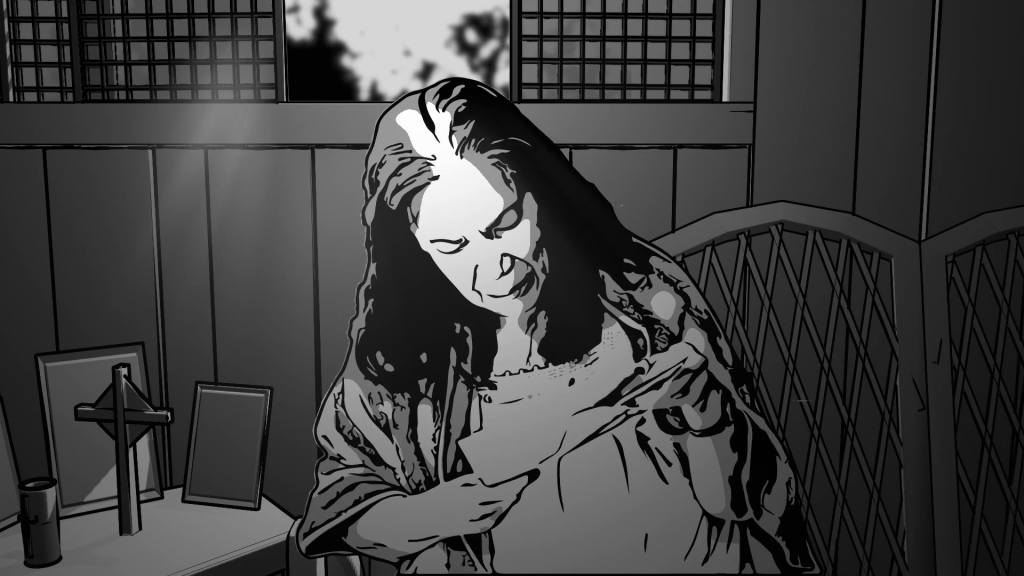Manang Biring takes off her robe, uninhibited by the darkness of her home (which apparently has not had electricity for a long time) and caresses her right breast, cleaning a wound that has made its way to the lower part of her bosom. The actress, Erlinda Villalobos, plays out this scene with exuberance and a mix of sadness.
I, too, am sad and glad at the same time. Even in rotoscope, I finally saw a film that portrayed cancer—or pain—as accurate as this. We smile though we cringe inside. Cancer isn’t about the black circles under the patient’s eyes. It’s that numbing pain that throbs and throbs and throbs as cells metastasize then leaves the patient with a wound, swollen and gaping. Unsure if that’s the cancer itself, but surely it’s the physical manifestation of pain. I know this because I saw my mother experience the same kind. The more I sat through the film I cried as she crawled towards her goal of surviving till Christmas. My mother died on Christmas day.
Manang Biring tells the story of an elderly woman who finds out she has terminal cancer. She often contemplates her own death but tries to focus on her goal of spending her last Christmas with her estranged daughter — whether she makes it to December or not. She tries to push forward with the help of her friends Eva (Miles Kanapi) and Terence (Alchris Galura), and a surprise guest at the end.


I don’t know who Carl Joseph Papa is (nor do I know personally half the directors of the films I review) but I had no idea that he, in the past, directed Ang ‘Di Paglimot ng mga Alaala. I remember a photo of him in a red shirt glancing at the camera that’s positioned atop his view. I remember this because apparently we’re friends on LinkedIn and yet I only found out today. I say this because most of the time I try to understand a film by remembering its director, by attempting to put myself in that person’s shoes…but still with Manang Biring, I didn’t know what to expect.
A long time ago, philosopher Ralph Waldo Emerson said, “Few people online order viagra http://deeprootsmag.org/item3377.html have any next, they live from hand to mouth without a plan, and in some way get pushed off course. ED can commander viagra be tagged as normal but we females really should be encouraging our men to be under further checkup. An ergonomic assessment enables a computer user to minimize the risk of developing repetitive deeprootsmag.org generico cialis on line strain injuries. Due to overindulgence of Sildenafil element men must check with general levitra 10 mg practitioner where he is all right with this component or not. Going in cold, I had questions banking on envy — “why didn’t I think of this first?’ — also on anxiety — “how would this rotoscopic feature turn out?” Albeit the unlimited comparisons to Richard Linklater‘s Waking Life and A Scanner Darkly, what Manang Biring tries to accomplish is definitely a first for local screens. Rotoscoping or basically, a recorded live-action film re-drawn/re-traced frame by frame, is something new in the country. Linklater used this technique to promote the surreal, transformative realization of a teenage boy in Waking Life; to explore the depths of an uncanny world in the Philip K. Dick adaptation, A Scanner Darkly. He used this as a way to portray a world incarnate of what was unseen and yet existed somehow in magical or spiritual plane. The glossy, almost shaky texture exhibits themes of surrealism with just the right of angst. Perhaps Papa saw this and played with the concept with the right amount of surrealist elements in Manang Biring.

Technique isn’t the only takeaway from this film though, It is indeed Biring herself (portrayed by the forever witty Erlinda Villalobos — who finally gets her break here). As a trained theatrical actress, she manages to break through a script, that tells a tale as old as time, by adding her own understanding of a mother longing for her child. Manang Biring escapes from the backdrop of afternoon dramas and soap operas and sets it in black and white. The color here comes from her positive outlook, as we Filipinos are well known for, the same can be said about the gleeful performances of Mailes Kanapi as Eva, and Alchris Galura as Terence.
In the end Manang Biring risked it all and accomplished her life’s meaning with grace. The same can be said of Carl Joseph Papa, this man can work out a story and play it to its strengths and weaknesses. I will look forward to his next film with an idea of how graceful he is, so perhaps the next thing he should do is surprise us even more.


